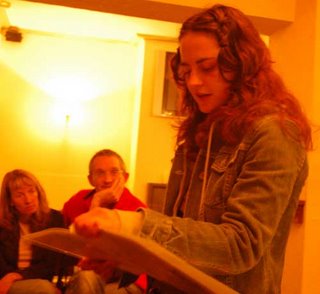Sam Towers 1918-2006
Sam Towers 1918-2006
Cotesbach Garret. Sam Towers was laid to rest today in the churchyard at St Mary’s, Cotesbach.
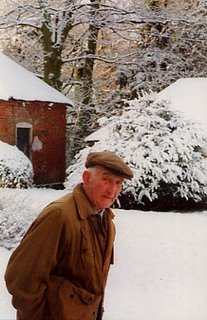 The funeral was a wonderful celebration of his life. The clergyman spoke of Sam having been ‘blessed with a sense of well being’ and ‘imparting it to everyone who had contact with him’.
The funeral was a wonderful celebration of his life. The clergyman spoke of Sam having been ‘blessed with a sense of well being’ and ‘imparting it to everyone who had contact with him’.
St. Mary’s, Cotesbach was packed. People had come from far and wide to pay their last respects to Sam.
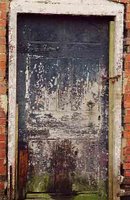 When I was living here in the garret of Cotesbach Hall where I am again as I write this, I would see Sam Towers almost every day. He would walk across the yard carrying his leather bucket on his way to tend to his hens in the old schoolhouse behind the battered door (pictured) and to dig his vegetable garden.
When I was living here in the garret of Cotesbach Hall where I am again as I write this, I would see Sam Towers almost every day. He would walk across the yard carrying his leather bucket on his way to tend to his hens in the old schoolhouse behind the battered door (pictured) and to dig his vegetable garden.
Sam was almost immaculate in his smart brown coat, tweed jacket, shirt, tie and cloth cap.
He would stop for a chat, tell an old yarn, talk about his garden or spread a little country wisdom, so very often ending with one of his favourite phrases: ‘Do a little, leave a lot’.
Sam Towers was wonderful with children. He always found time for people, young, old and in between. He was not a traveller. As the priest said ‘he liked to be where he belonged’ among his family.
He loved animals, except foxes. I remember being with Sam in 'the covers’ (the woods) when he produced his ‘barking iron’ (gun) and shot a fox – to prevent it from killing his beloved hens.
The funeral service was fascinating. I had forgotten that Sam was one of 10 children and also about his time with the South Atherstone Hunt and as a gamekeeper. I did recall Sam had been a jockey half a century ago; his love for horses was certainly great.
Sam came to Cotesbach when he married in 1948 and kept a garden outside his cottage and a vegetable plot in the grounds of Cotesbach Hall for around half a century.
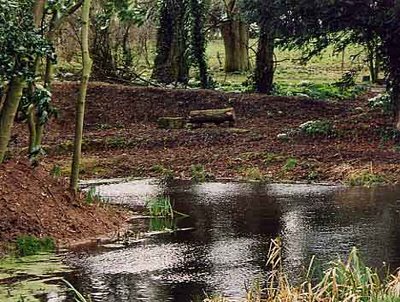 He was often around when we lived there and was always willing to lend a hand. If there was a rope to be pulled or a ladder to be held, Sam Towers would be on the end of it. More often we would bump into each other beside the village pond (pictured) and have a chinwag about life.
He was often around when we lived there and was always willing to lend a hand. If there was a rope to be pulled or a ladder to be held, Sam Towers would be on the end of it. More often we would bump into each other beside the village pond (pictured) and have a chinwag about life.
After the gentlemen of Wilf Smith & Son Funeral Directors had carried Sam’s coffin out into the churchyard where he is now buried, the mourners shuffled around chatting outside the church door.
Family members followed traditional by casting clumps of earth into the open grave. It struck me that although Sam Towers had physically been a small man, his presence had been great.
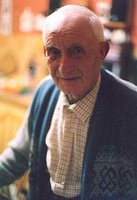 I visited Sam late last year at his cottage. Illness had dimmed his eyes a tad but his friendliness and hospitality were undiminished.
I visited Sam late last year at his cottage. Illness had dimmed his eyes a tad but his friendliness and hospitality were undiminished.
His widow Dorothy – or Doll, as the vicar called her – and the family invited everybody to Cotesbach Village Hall for the wake.
I thought of how Sam was born in 1918 at the end of the Great War and served in the Second World War. He told me ‘bad water’ had done for him and he could not sup alcohol.
Over the years I have attended many events at the Village Hall but none has been as full of joy as this one. Sam’s spirit seemed among us.
Back at base, my friend Phil and I retired to the Sickle & Stick to continue the wake. Gradually the room filled up and by the end of the evening it was busy.
I wrote about Sam Tower's life and send-off in the Sickle & Stick Book. And then something extraordinary happened. A Polish girl wandered in. This was amazing because the Sickle & Stick is the equivalent of a shed in a field in an obscure nook in the back of beyond. It does not get uninvited visitors.
The girl, in her early twenties, said her car had broken down on a distant road and she had wandered across the fields and stumbled on this dwelling. She seemed greatly down in the dumps.
We sorted her out with a drink and she explained that she had that day failed to land a menial job and had been dumped by her boyfriend.
She brightened up a little warming her feet beside he roaring fire we had built, and told us she had trained a journalist in Poland.
With a twinkle in my eye I told her of my time as the Editor of the Cotesbach Bell (ignoring my real journalistic pedigree), a newsheet dedicated to life in Cotesbach, a hamlet with a population of around 150.
I mentioned the newspaper's finest moment – recruitment the then 82-year-old Sam Towers as its star columnist. This occurred after I approached him beside the henhouse with a tape recorder and said: ‘Hi Sam, I’d like you join the Bell as columnist please. Tell me about your garden!’
Without so much as a moment of hesitation, Sam fluently expressed his views on his garden and the weather and life. Five minutes later I turned off the tape and thanked him.
All I had to do was transcribe his words to have the column verbatim!
When the Polish girl left, she asked if she could write something in the Sickle & Stick Book. After her taxi had spirited her away, we read out her entry. She said her visit had turned despair into joy. She had found her purpose. Now she knew what she wanted to with her life.
To be frank I was unsure what she meant. Phil said he knew: hearing about how a hamlet the size of Cotesbach could have a newspaper (even for a short time) had inspired her. Reading Sam's column had rekindled her love of journalism
I wondered if she had not just been taken by the pure country life; the simple values epitomised by Sam that we had told her about.
Whatever the case, she had experienced an epiphany in the Sickle & Stick.
Somehow the torch of Sam Towers had been mystically passed on to a new generation.
Here's Sam's column:
Sam says…
Gardening by Sam Towers
I’ve been gardening in Cotesbach for 50 years and try to do some every day. I always say, ‘Do a little. Leave a lot’, though at this time of year it’s best to get it done. Plant as soon as you can now!
Peas, beans, onions can all go in. I put the onions in no more than three-quarters of an inch deep. Don’t forget to hoe the weeds off and pull the soil away as they get a bit bigger.
Kidney beans don’t want to go in for another couple of weeks. I always put them in on the fifteenth of May. Just plant them in a row.
With the peas, make a trench an inch-and-a-half to two inches deep and plant them three in a row, spaced two inches apart.
Yesterday I put in parsnips and carrots. I always put in carrots a bit on the thick side.
There’s still a bit of frost about but it won’t hurt, so long as your seeds are covered up in soil.
It’ll soon be time for cabbage plants - any day now. But it’s been a bad old time for digging, what with the wet.
You should be in the garden every day. There’s always a job to do. But as I say: ‘Do a little. Leave a lot!’
Cotesbach Garret. Sam Towers was laid to rest today in the churchyard at St Mary’s, Cotesbach.
 The funeral was a wonderful celebration of his life. The clergyman spoke of Sam having been ‘blessed with a sense of well being’ and ‘imparting it to everyone who had contact with him’.
The funeral was a wonderful celebration of his life. The clergyman spoke of Sam having been ‘blessed with a sense of well being’ and ‘imparting it to everyone who had contact with him’.St. Mary’s, Cotesbach was packed. People had come from far and wide to pay their last respects to Sam.
 When I was living here in the garret of Cotesbach Hall where I am again as I write this, I would see Sam Towers almost every day. He would walk across the yard carrying his leather bucket on his way to tend to his hens in the old schoolhouse behind the battered door (pictured) and to dig his vegetable garden.
When I was living here in the garret of Cotesbach Hall where I am again as I write this, I would see Sam Towers almost every day. He would walk across the yard carrying his leather bucket on his way to tend to his hens in the old schoolhouse behind the battered door (pictured) and to dig his vegetable garden. Sam was almost immaculate in his smart brown coat, tweed jacket, shirt, tie and cloth cap.
He would stop for a chat, tell an old yarn, talk about his garden or spread a little country wisdom, so very often ending with one of his favourite phrases: ‘Do a little, leave a lot’.
Sam Towers was wonderful with children. He always found time for people, young, old and in between. He was not a traveller. As the priest said ‘he liked to be where he belonged’ among his family.
He loved animals, except foxes. I remember being with Sam in 'the covers’ (the woods) when he produced his ‘barking iron’ (gun) and shot a fox – to prevent it from killing his beloved hens.
The funeral service was fascinating. I had forgotten that Sam was one of 10 children and also about his time with the South Atherstone Hunt and as a gamekeeper. I did recall Sam had been a jockey half a century ago; his love for horses was certainly great.
Sam came to Cotesbach when he married in 1948 and kept a garden outside his cottage and a vegetable plot in the grounds of Cotesbach Hall for around half a century.
 He was often around when we lived there and was always willing to lend a hand. If there was a rope to be pulled or a ladder to be held, Sam Towers would be on the end of it. More often we would bump into each other beside the village pond (pictured) and have a chinwag about life.
He was often around when we lived there and was always willing to lend a hand. If there was a rope to be pulled or a ladder to be held, Sam Towers would be on the end of it. More often we would bump into each other beside the village pond (pictured) and have a chinwag about life.After the gentlemen of Wilf Smith & Son Funeral Directors had carried Sam’s coffin out into the churchyard where he is now buried, the mourners shuffled around chatting outside the church door.
Family members followed traditional by casting clumps of earth into the open grave. It struck me that although Sam Towers had physically been a small man, his presence had been great.
 I visited Sam late last year at his cottage. Illness had dimmed his eyes a tad but his friendliness and hospitality were undiminished.
I visited Sam late last year at his cottage. Illness had dimmed his eyes a tad but his friendliness and hospitality were undiminished.His widow Dorothy – or Doll, as the vicar called her – and the family invited everybody to Cotesbach Village Hall for the wake.
I thought of how Sam was born in 1918 at the end of the Great War and served in the Second World War. He told me ‘bad water’ had done for him and he could not sup alcohol.
Over the years I have attended many events at the Village Hall but none has been as full of joy as this one. Sam’s spirit seemed among us.
Back at base, my friend Phil and I retired to the Sickle & Stick to continue the wake. Gradually the room filled up and by the end of the evening it was busy.
I wrote about Sam Tower's life and send-off in the Sickle & Stick Book. And then something extraordinary happened. A Polish girl wandered in. This was amazing because the Sickle & Stick is the equivalent of a shed in a field in an obscure nook in the back of beyond. It does not get uninvited visitors.
The girl, in her early twenties, said her car had broken down on a distant road and she had wandered across the fields and stumbled on this dwelling. She seemed greatly down in the dumps.
We sorted her out with a drink and she explained that she had that day failed to land a menial job and had been dumped by her boyfriend.
She brightened up a little warming her feet beside he roaring fire we had built, and told us she had trained a journalist in Poland.
With a twinkle in my eye I told her of my time as the Editor of the Cotesbach Bell (ignoring my real journalistic pedigree), a newsheet dedicated to life in Cotesbach, a hamlet with a population of around 150.
I mentioned the newspaper's finest moment – recruitment the then 82-year-old Sam Towers as its star columnist. This occurred after I approached him beside the henhouse with a tape recorder and said: ‘Hi Sam, I’d like you join the Bell as columnist please. Tell me about your garden!’
Without so much as a moment of hesitation, Sam fluently expressed his views on his garden and the weather and life. Five minutes later I turned off the tape and thanked him.
All I had to do was transcribe his words to have the column verbatim!
When the Polish girl left, she asked if she could write something in the Sickle & Stick Book. After her taxi had spirited her away, we read out her entry. She said her visit had turned despair into joy. She had found her purpose. Now she knew what she wanted to with her life.
To be frank I was unsure what she meant. Phil said he knew: hearing about how a hamlet the size of Cotesbach could have a newspaper (even for a short time) had inspired her. Reading Sam's column had rekindled her love of journalism
I wondered if she had not just been taken by the pure country life; the simple values epitomised by Sam that we had told her about.
Whatever the case, she had experienced an epiphany in the Sickle & Stick.
Somehow the torch of Sam Towers had been mystically passed on to a new generation.
Here's Sam's column:
Sam says…
Gardening by Sam Towers
I’ve been gardening in Cotesbach for 50 years and try to do some every day. I always say, ‘Do a little. Leave a lot’, though at this time of year it’s best to get it done. Plant as soon as you can now!
Peas, beans, onions can all go in. I put the onions in no more than three-quarters of an inch deep. Don’t forget to hoe the weeds off and pull the soil away as they get a bit bigger.
Kidney beans don’t want to go in for another couple of weeks. I always put them in on the fifteenth of May. Just plant them in a row.
With the peas, make a trench an inch-and-a-half to two inches deep and plant them three in a row, spaced two inches apart.
Yesterday I put in parsnips and carrots. I always put in carrots a bit on the thick side.
There’s still a bit of frost about but it won’t hurt, so long as your seeds are covered up in soil.
It’ll soon be time for cabbage plants - any day now. But it’s been a bad old time for digging, what with the wet.
You should be in the garden every day. There’s always a job to do. But as I say: ‘Do a little. Leave a lot!’
Labels: Charles Clarke, Cotesbach, Dr Who, John Prescott, Oliver's Poetry, Sam Towers 1918-2006, Sickle and Stick, St. Mary's Cotesbach
